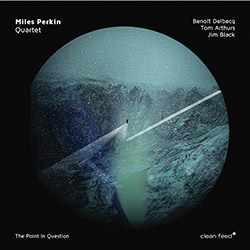
Long before it became the capital of the reunited Germany three decades ago, Berlin (or West Berlin as it was known up until that time) was a hotbed of music. Not unlike the Big Apple, it lured many within its walled-in confines, a tendency that just skyrocketed post-1989. Musicians from all corners of the world call it home now, which has been the case for all but one of the four participants in this recording. The band's leader, double bassist Miles Perkin, is originally from Winnipeg, but moved to Montreal to immerse himself into its scene as he pursued his degree and stayed on for a while thereafter. Trumpeter Tom Arthurs made his way from the neighboring U.K. and has found steady work in the European creative music scene, including a recent teaching position in Switzerland, where he now resides. Jim Black needs no introduction, save to say he too has secured a nice teaching job for himself, his in the German capital. The odd man out, of course, is pianist Beno�t Delbecq, a fixture on the Parisian scene and known beyond.
Eight years after its debut (Objects in Mirror Are Closer Than They Appear, self-produced), the quartet has brought Black into the fold in lieu of Thom Gossage, an old buddy of Perkin from his Montreal days and sideman in that drummer's quintet Other Voices. In his own notes, the bassist talks about the writing of music for improvisers as something of an "inexact science", where things remain incomplete until such time they are played. "So when is a piece finished?" he asks, then leaves us to ponder about this in The Point in Question, the album's second track and title cut of the album.. This piece is also quite representative of the overall tenor of the recording, in that it unfolds in a very deliberate and mostly unhurried way, the themes often played in unisons between either bass and trumpet or trumpet and piano.
Overall, a mood of quiet intensity prevails over five of the seven tracks of this 48-minute side, the exceptions being the opening "What did you Expect" and the brief "5dreaming" (track 5) that build some momentum from of a fleet ostinato held on the leader's bass equipped with the low C extension. The harmonies are quite open, and Delbecq's trademark aleatory piano preparations add to the ambiguity while adding some rhythmical enhancements to those provided by the drummer, whose measured strokes and subtle brushing are perfectly suited to the music. All told, this is an album that might not jump out at you at first listening, as this writer can attest, but its sounds are enticing enough to warrant at least another good listen, if not two.
Comments and Feedback:



More Recent Reviews, Articles, and Interviews @ The Squid's Ear...


|

